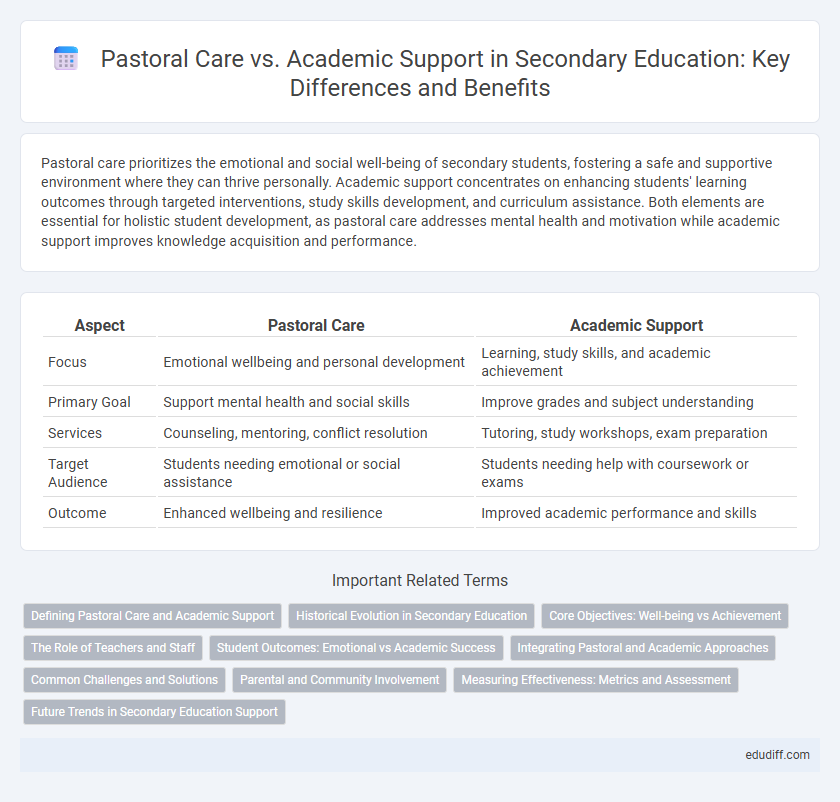Pastoral care prioritizes the emotional and social well-being of secondary students, fostering a safe and supportive environment where they can thrive personally. Academic support concentrates on enhancing students' learning outcomes through targeted interventions, study skills development, and curriculum assistance. Both elements are essential for holistic student development, as pastoral care addresses mental health and motivation while academic support improves knowledge acquisition and performance.
Table of Comparison
| Aspect | Pastoral Care | Academic Support |
|---|---|---|
| Focus | Emotional wellbeing and personal development | Learning, study skills, and academic achievement |
| Primary Goal | Support mental health and social skills | Improve grades and subject understanding |
| Services | Counseling, mentoring, conflict resolution | Tutoring, study workshops, exam preparation |
| Target Audience | Students needing emotional or social assistance | Students needing help with coursework or exams |
| Outcome | Enhanced wellbeing and resilience | Improved academic performance and skills |
Defining Pastoral Care and Academic Support
Pastoral care centers on the emotional, social, and spiritual well-being of students, fostering a supportive environment to enhance overall mental health and personal development. Academic support involves targeted interventions such as tutoring, study skills workshops, and curriculum assistance aimed at improving student performance and learning outcomes. Both elements are essential in holistic education, addressing distinct but complementary aspects of student success.
Historical Evolution in Secondary Education
The historical evolution of pastoral care and academic support in secondary education reveals distinct yet complementary trajectories, with pastoral care emerging from welfare movements in the early 20th century aimed at student well-being, while academic support developed alongside curricular reforms focused on standardized testing and skill acquisition. Throughout the mid-20th century, these domains increasingly intersected as schools recognized the integral role of emotional and social development in academic success. Contemporary secondary education frameworks integrate pastoral care and academic support to foster holistic student development, reflecting a shift from isolated approaches to comprehensive student-centered strategies.
Core Objectives: Well-being vs Achievement
Pastoral care prioritizes students' emotional well-being by providing support systems that foster mental health, resilience, and a positive school environment. Academic support targets achievement through tailored learning strategies, skill development, and performance monitoring to enhance educational outcomes. Balancing well-being and achievement ensures comprehensive student development, addressing both personal growth and academic success.
The Role of Teachers and Staff
Teachers and staff play a crucial role in pastoral care by fostering emotional well-being, providing guidance, and creating a supportive school environment. In academic support, their focus shifts to delivering subject-specific instruction, monitoring student progress, and implementing strategies to enhance learning outcomes. Balancing both roles requires a holistic approach to address students' diverse needs effectively.
Student Outcomes: Emotional vs Academic Success
Pastoral care in secondary education prioritizes emotional well-being, fostering resilience and mental health that enhance student engagement and overall happiness. Academic support targets cognitive skills and knowledge acquisition, directly improving grades, test scores, and subject mastery. Combining both approaches leads to balanced student outcomes, where emotional stability underpins academic achievement and long-term success.
Integrating Pastoral and Academic Approaches
Integrating pastoral care and academic support enhances student well-being and academic achievement by addressing emotional, social, and educational needs holistically. Schools that implement coordinated strategies between counselors and educators foster resilience, motivation, and improved learning outcomes. This approach ensures personalized interventions that support both mental health and cognitive development, creating a balanced environment for student success.
Common Challenges and Solutions
Common challenges in pastoral care include managing emotional well-being and social issues, while academic support primarily addresses learning difficulties and skill gaps. Solutions often involve integrating counseling services with tailored tutoring programs to holistically support students. Collaboration between pastoral care teams and academic staff enhances student engagement and overall success.
Parental and Community Involvement
Effective pastoral care fosters strong parental and community involvement by addressing students' emotional and social needs, creating a supportive school environment. Academic support programs engage parents through regular communication and collaborative strategies that enhance student learning outcomes. Integrating both approaches maximizes student well-being and academic achievement by leveraging family and community resources.
Measuring Effectiveness: Metrics and Assessment
Measuring the effectiveness of pastoral care involves qualitative metrics such as student well-being surveys, emotional resilience assessments, and attendance rates linked to mental health interventions. Academic support effectiveness is often quantified through standardized test score improvements, grade point average trends, and progression statistics in subject mastery. Combining these metrics provides a holistic assessment framework for educational institutions to enhance both emotional support and academic achievement.
Future Trends in Secondary Education Support
Future trends in secondary education support emphasize integrating pastoral care with academic support to foster holistic student development. Increasing use of digital platforms enables personalized learning and mental health monitoring, promoting both academic success and emotional well-being. Collaborative approaches between educators, counselors, and technology-driven interventions are shaping more adaptive and inclusive secondary education environments.
Pastoral care vs Academic support Infographic

 edudiff.com
edudiff.com